The iGaming industry is undeniably a global powerhouse. It brings together players from every corner of the world, from the dynamic cities of Latin America and the tech-forward centers of Asia to fast-growing markets in Africa. With the sector projected to surpass $100 billion in revenue by 2025, operators must move beyond a “one-language-fits-all” approach. Creating a multilingual website, complete with properly implemented hreflang tags, culturally relevant adaptations, and precise translations, is no longer optional. It is essential for staying competitive, optimizing SEO performance, and attracting a more diverse player base. In this guide, we’ll explore why multilingual strategies are critical for iGaming platforms, how to effectively implement hreflang tags, the significant role of cultural customization, and key pitfalls to avoid that could undermine your efforts.
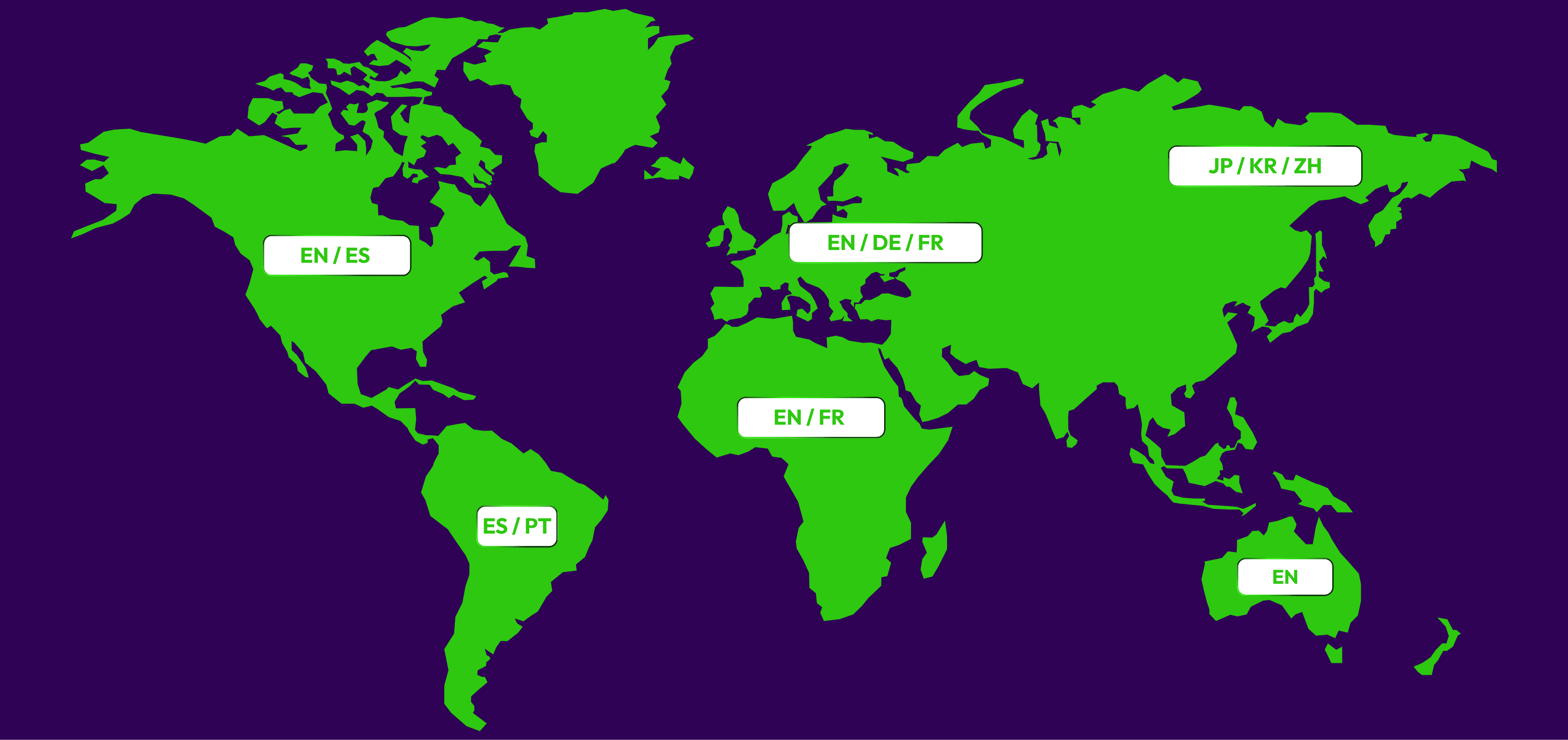
The Case for Multilingual iGaming Strategies: An Unavoidable Imperative
Imagine a player from São Paulo or Mexico City landing on your casino website, only to find it exclusively in English. The odds of them leaving immediately are high, far higher than any jackpot they might be chasing. Here’s why adopting this approach isn’t just a recommendation but a necessity:
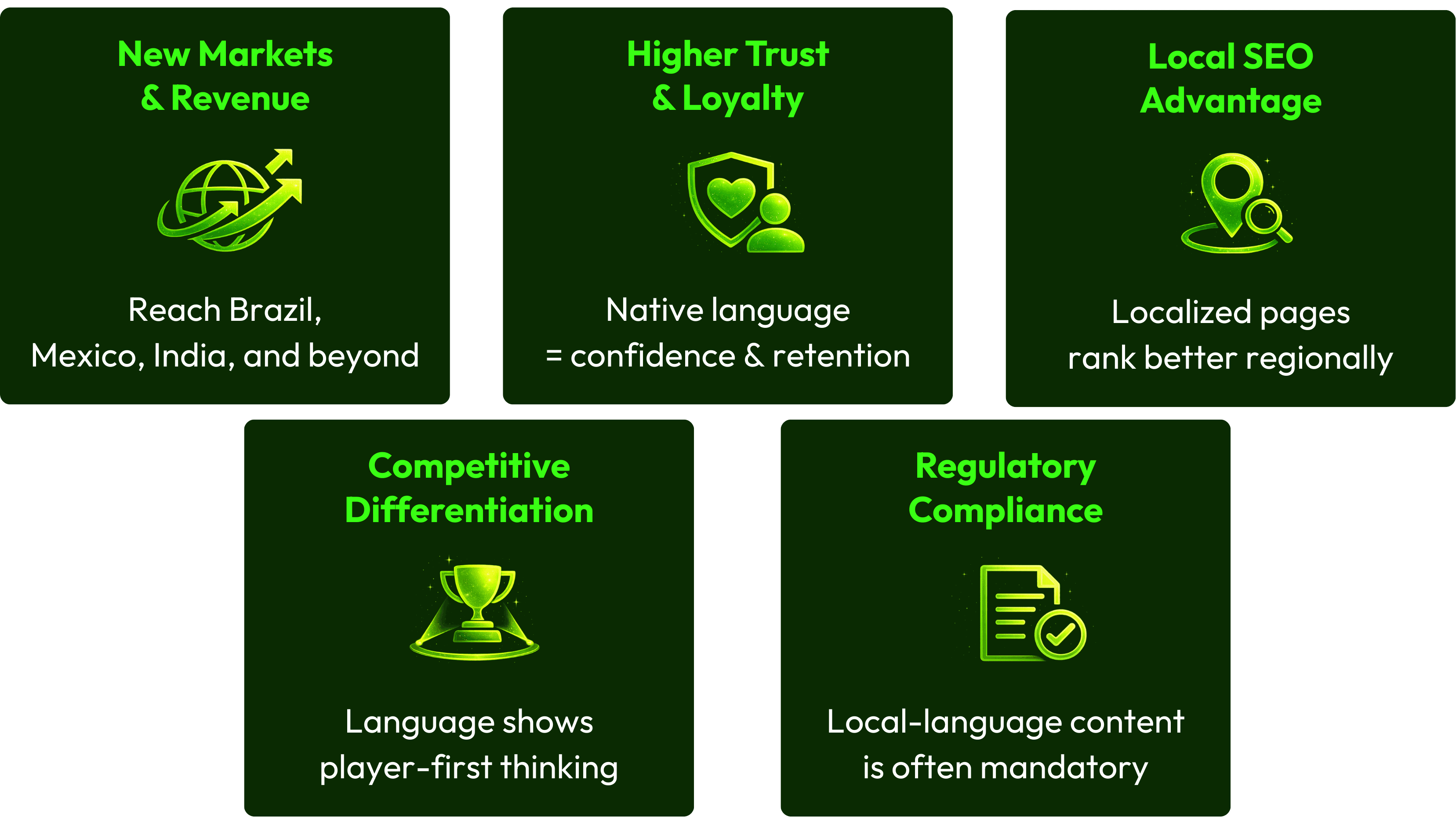
- Unlock New Markets and Revenue Streams: Localizing content into languages such as Spanish, Portuguese, or Hindi allows you to tap into thriving regions where iGaming continues to expand.
- Enhance Player Trust and Engagement: Players naturally gravitate toward platforms they can navigate in their native language, leading to higher trust, conversions, and long-term loyalty.
- Dominate Local SEO: Search engines like Google prioritize localized content, giving websites a competitive edge in regional search rankings.
- Differentiate Yourself: Offering a multilingual experience signals to players that your organization recognizes and prioritizes their unique needs and preferences. This helps you stand out in a crowded market.
- Regulatory Compliance: Many countries, including Spain and Portugal, mandate local-language content to comply with regulations.
Failing to embrace multilingual strategies means essentially handing over market share and profits to competitors who have prioritized cultural and linguistic diversity. Such oversight can be costly in a market as competitive as iGaming.
Hreflang Tags: What They Are and Why They Matter
Hreflang tags are crucial HTML elements designed to inform search engines about the linguistic and regional targeting of specific pages. In simpler terms, they act as a digital routing system, ensuring users are directed to the most relevant version of your website based on their language and location. For instance, they allow Google to understand which page is tailored for Spanish-speaking users in Mexico versus Portuguese-speaking users in Brazil. While this concept may seem straightforward, the strategic implementation of hreflang tags is transformative. It directly impacts your website’s visibility, user experience, and overall engagement on a global scale.
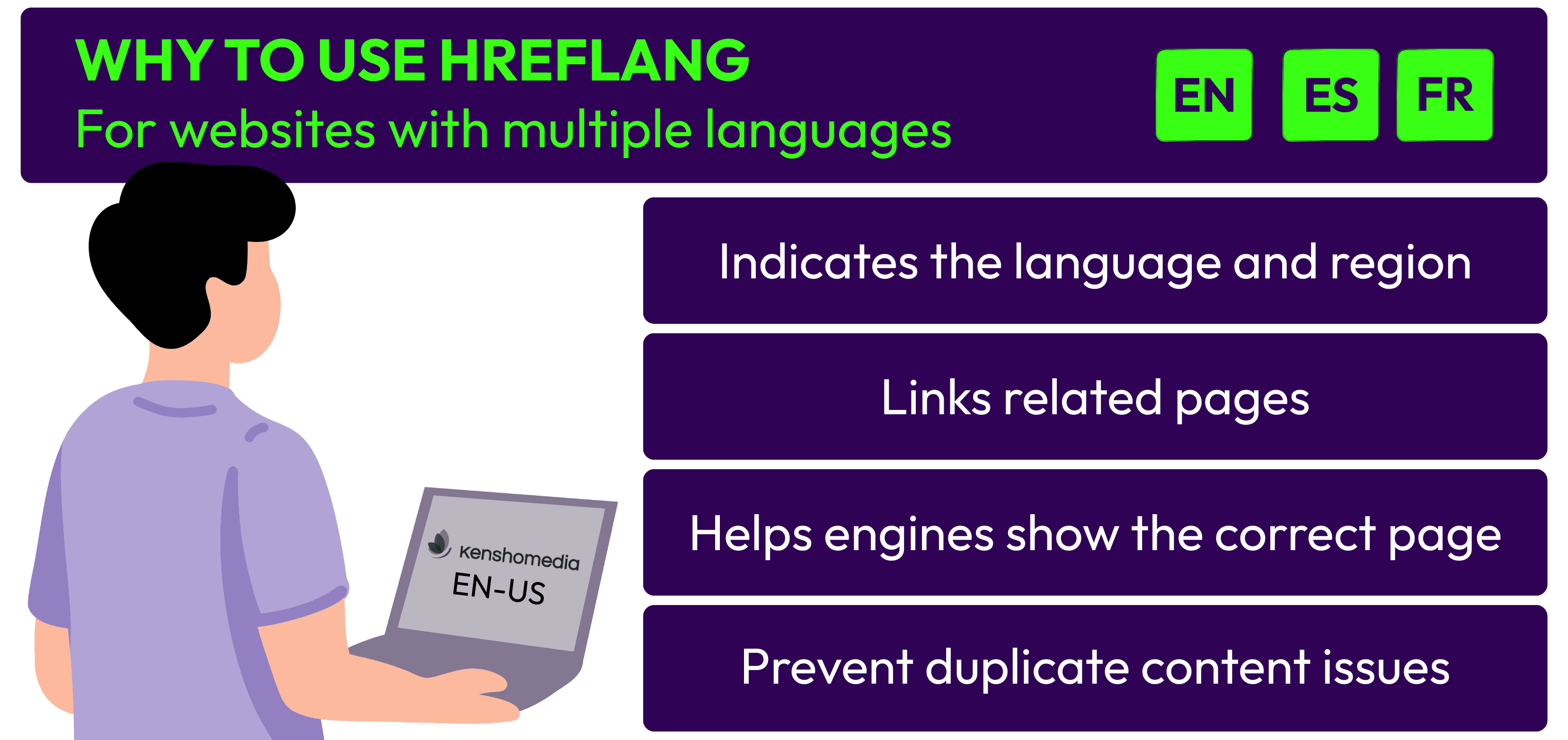
Why Hreflang Tags Are Essential to Your SEO Strategy
- Boost Local Search Rankings: Hreflang tags enable Google to deliver the correct page to the appropriate audience, significantly improving your visibility in localized search results.
- Avoid Duplicate Content Issues: Without properly implemented hreflang tags, Google may interpret your Spanish and Portuguese pages as duplicate content, which can lead to penalties that harm your site’s performance.
- Enhance User Experience: Directing users to the correct version of your website ensures they find what they expect, reducing bounce rates and increasing satisfaction.
- Expand Your Global Reach: Hreflang tags ensure your site appears in local search results across diverse markets, such as Argentina or Japan, where localized content is a competitive advantage.
Consequences of Neglecting Hreflang Tags: A Risky Oversight
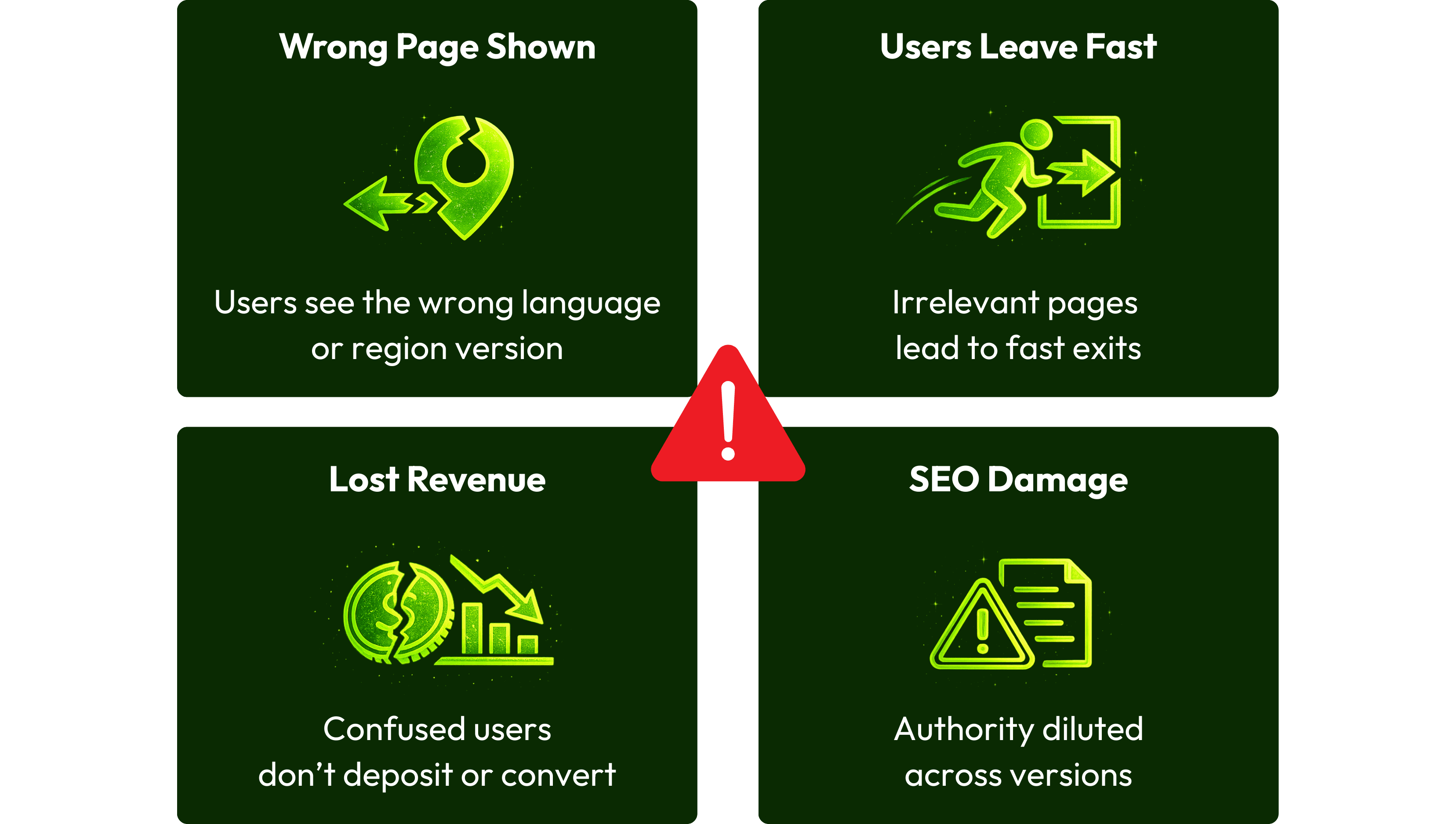
Failing to implement hreflang tags properly can result in significant drawbacks:
- Incorrect Page Indexing: Without hreflang, search engines may display the wrong version of your website, such as an English page for users in Madrid, causing confusion and frustration.
- High Bounce Rates: Users landing on irrelevant pages are unlikely to stay, resulting in higher bounce rates and lower conversion opportunities.
- Revenue Loss: If players cannot locate the appropriate content quickly, they are less likely to engage, deposit funds, or play.
- SEO Challenges: Duplicate content issues can diminish your site’s authority, complicating efforts to improve your rankings in competitive markets.
Steps to Implement Hreflang Tags Effectively
Configuring hreflang tags does not require advanced technical expertise, but it does require precision. Adhering to these steps will help avoid potential errors:
Define Your Target Languages and Regions
Identify the languages and regions your website will serve. For example, use language codes such as English (en), Spanish (es), and Portuguese (pt) alongside regional designations like us, mx, or br.Example: A platform targeting Spain, Mexico, and Brazil would require tags such as es-es, es-mx, and pt-br.
Integrate Hreflang Tags in Your HTML
Add hreflang tags within the <head> section of each webpage, or utilize HTTP headers if the resource is a PDF.Syntax Example:
<link rel="alternate" hreflang="language-code-region-code" href="URL" />Implementation for a Homepage:

- Don’t Forget x-default:
- Use x-default for users who don’t match any specific language or region—usually your English page.
- Example: <link rel="alternate" hreflang="x-default" href="https://www.example.com/en-us/" />
- Try XML Sitemaps for Big Sites:
- Got thousands of pages? Add hreflang to your XML sitemap to make Google’s life easier.
Example:

- Check Your Work:
- Use Google Search Console, Ahrefs, or Merkle’s Hreflang Tag Tester to spot errors—like missing tags or broken URLs.
Common Hreflang Mistakes to Avoid
- Missing Return Tags: Each page must link back to all other language versions, ensuring Google can correctly interpret the relationships.
- Incorrect Codes: Adhere strictly to ISO standards (e.g., es-mx instead of sp-mx, as mistakes like this are more common than you might think).
- Broken Links: Verify that every URL referenced in your hreflang tags is accessible and returns a 200 status code.
- Overcomplicating Tags: Avoid adding hreflang tags for regions your site does not serve. Simplicity and focus are key.
Cultural Adaptation: It’s More Than Translation

While accurate translation is important, building a culturally resonant experience goes far deeper. Cultural adaptation ensures your platform feels intentionally designed for users in each market, creating trust and engagement.
How to Execute Cultural Adaptation Effectively
Localized Promotions
Tailor offers and bonuses to align with local customs and events. For example, free spins during Carnival in Brazil or matched deposits for Día de los Muertos in Mexico can have a powerful impact.Example: A "Lunar New Year" slot tournament could significantly boost player participation in China.
- Localized Payment Options
Offer trusted, region-specific payment methods such as Boleto Bancário (Brazil), OXXO (Mexico), or UPI (India). Display prices in local currencies like MXN, BRL, or INR to enhance clarity and trust.
- Culturally Relevant Visuals
Adapt design elements such as colors and imagery to avoid cultural faux pas while aligning with local preferences. For instance:
- Red and gold are considered lucky in China but may feel overpowering in European markets.
- Steer clear of sensitive imagery, such as religious symbols, in more conservative regions.
- Appropriate Tone and Language
Vary language tone based on cultural norms. For instance:
- Latin America tends to prefer a friendly and informal tone ("tú").
- Europe may lean toward more formal language ("usted" in Spain, depending on the audience).
- Example: In Brazil, an engaging "Bora jogar!" (Let's play!) is effective, while in Portugal, a more polished tone may be better received.
Risks of Overlooking Cultural Adaptation
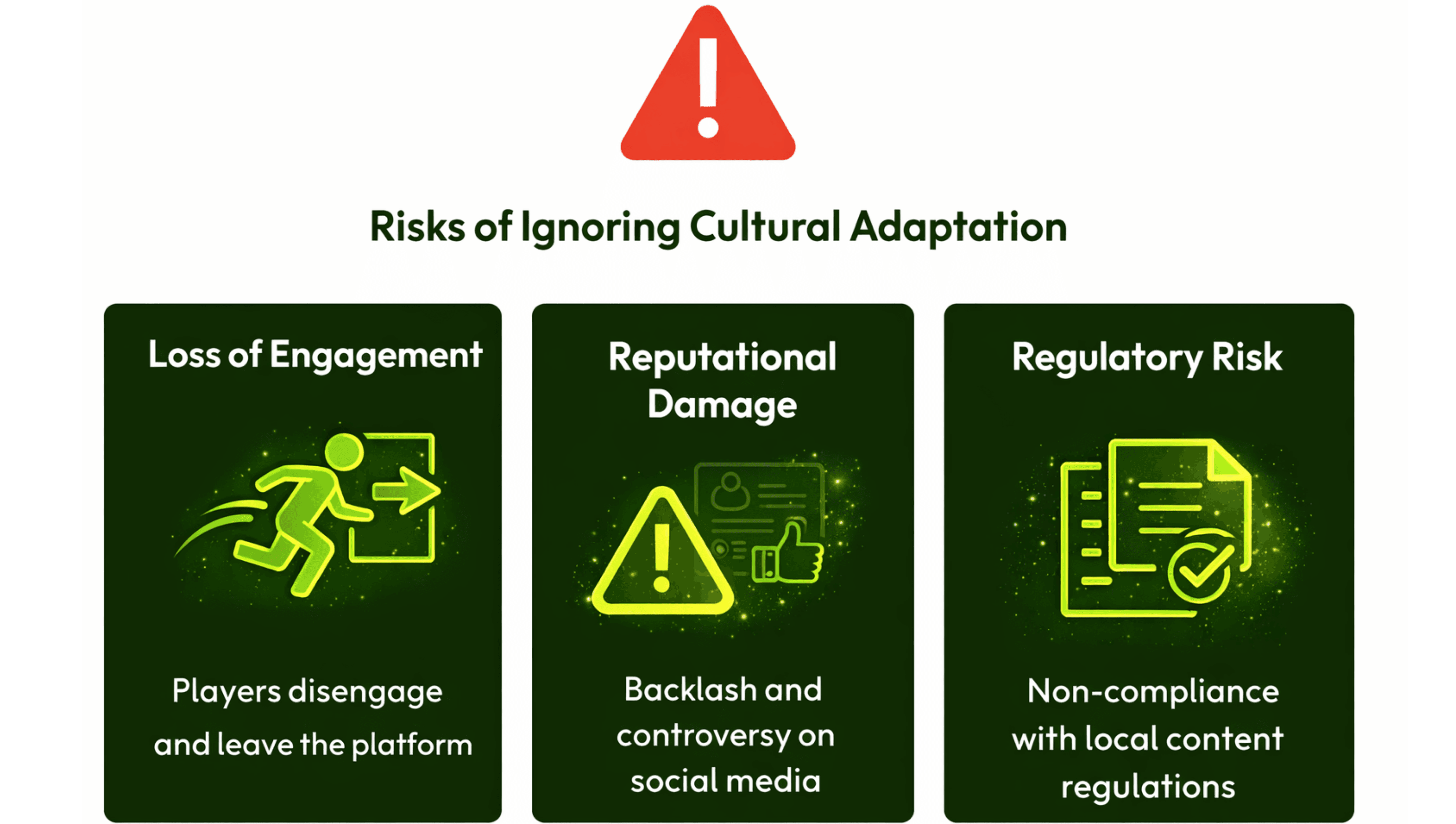
- Loss of Engagement: Promotions or payment systems that don’t resonate with players will drive them away.
- Reputational Damage: Cultural missteps, such as inappropriate imagery, could lead to backlash, particularly on social media.
- Regulatory Compliance Issues: Certain jurisdictions require culturally appropriate content as part of licensing conditions.
Why Accurate Translations Are a Cornerstone of Success
Poor translations can seriously undermine trust and credibility. A precise and locally informed translation strategy is critical.
Translation Best Practices
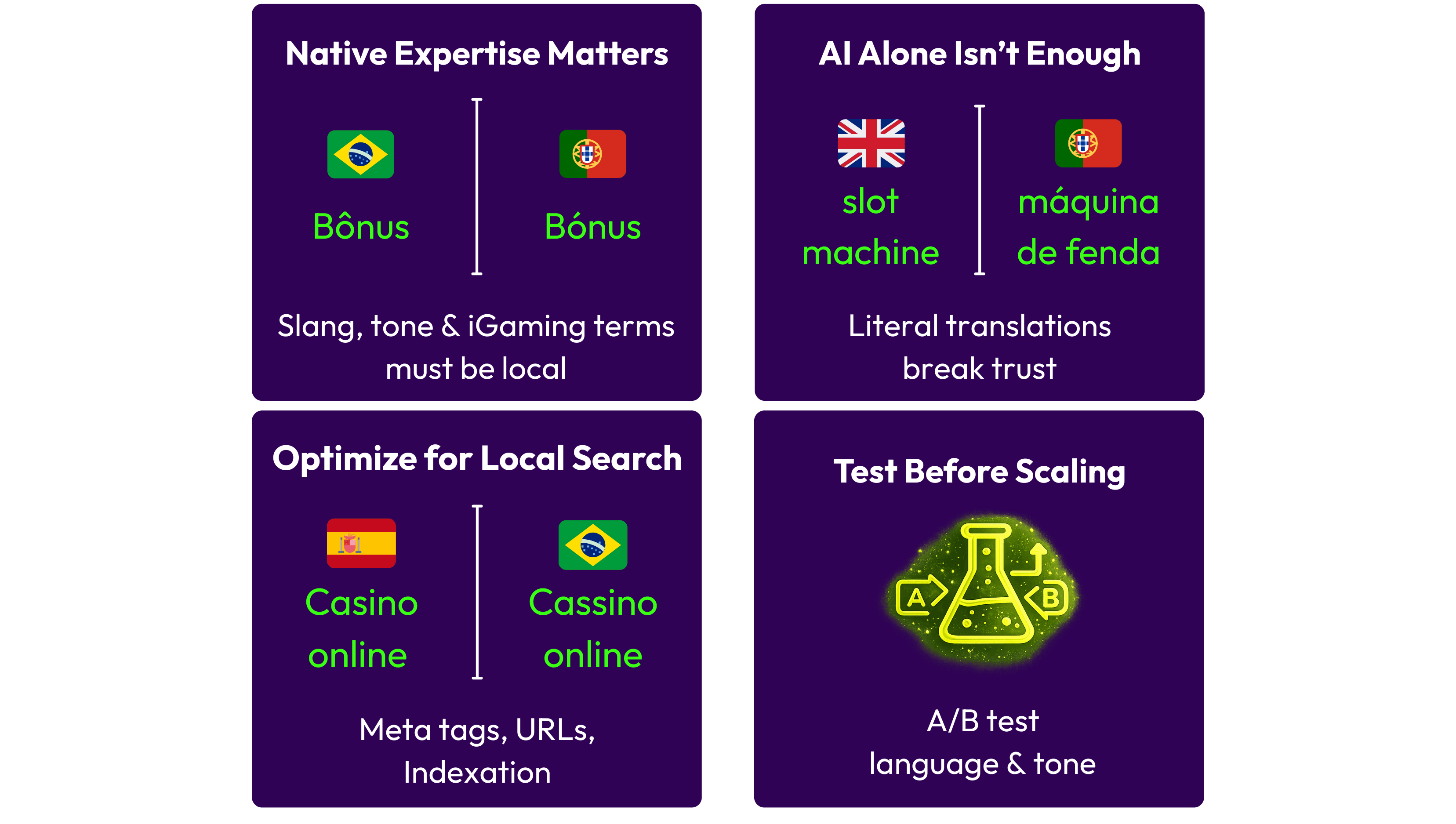
- Work with Native Experts: Engage professional translators familiar with iGaming terminology and local slang. For example, in Brazil, "bônus" is used, while in Portugal, it’s "bónus." Even small differences matter.
- Avoid Machine Translation Alone: While tools like Google Translate are helpful for drafts, relying solely on them risks inaccuracies (e.g., translating "slot machine" into the nonsensical "máquina de fenda" in Portuguese).
- Incorporate Local SEO Keywords: Optimize translated content with locally relevant search terms (e.g., "casino online" in Spain versus "cassino online" in Brazil). Tools like SEMrush can help identify suitable keywords.
- Test and Refine: Use A/B testing to assess the effectiveness of translations. Tools such as Grammarly or DeepL can help fine-tune tone before publishing.
SEO and Language Localization
- Translate meta titles, meta descriptions, and alt text for each language version.
- Opt for user-friendly URLs, using either subdirectories (e.g., www.example.com/es-es/) or country-specific domains (e.g., www.example.es).
- Submit your site to regional search engines (e.g., google.es for Spain or google.com.br for Brazil) via Search Console to improve indexation.
Technical Challenges of Multilingual Sites
Developing a multilingual iGaming platform involves more than translation. Technical complexities must be effectively managed to ensure a seamless experience.
Common Technical Challenges

- CMS Limitations: Choose a content management system (CMS) with robust multilingual support, such as WordPress with WPML or Polylang, to handle dynamic content effectively.
- Site Speed: Serving multiple language versions can slow your site. Combat this with a content delivery network (CDN) like Cloudflare.
- Dynamic Content Translation: Features like live betting odds or real-time dealer streams require careful upfront planning to ensure accurate, instant translations.
- Mobile Optimization: With many players accessing iGaming platforms via mobile devices, every language version must be fully responsive and mobile-friendly.
Solutions
- Automate translations using tools like Phrase or Lokalise to streamline processes.
- Implement lazy-loading techniques to reduce load times by loading only language-specific elements on demand.
- Conduct regular technical audits with tools like Screaming Frog to identify broken links, missing hreflang tags, and other issues.
Must-Have Tools for Multilingual Success

Platforms such as Phrase, Lokalise, or Crowdin make managing multilingual content more efficient.

Use tools like Ahrefs, SEMrush, or Moz to track hreflang performance and keyword rankings.

Tools like Hofstede Insights or SimilarWeb help identify market-specific trends.

Check site performance and hreflang implementation with Google Search Console, Merkle’s Hreflang Tester, or GTmetrix.
Building a Global iGaming Leader
Embracing a multilingual strategy is essential for long-term success in the iGaming industry. By leveraging hreflang tags, cultural intelligence, and precise translations, you go beyond merely creating a localized site; you develop a platform tailored to players worldwide. While implementation may require effort: technical configuration, cultural adjustments, and expert assistance; the rewards are substantial: improved rankings, enhanced player satisfaction, and access to an expanding global customer base. Start by auditing your site, defining target regions, and investing in professional expertise. The result? A highly competitive iGaming brand that thrives internationally.
